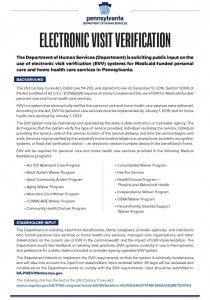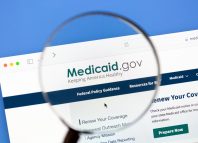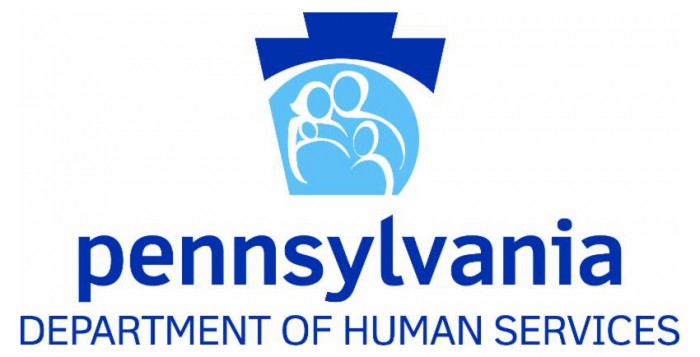The Department of Human Services (Department) is soliciting public input on the use of electronic visit verification (EVV) systems for Medicaid-funded personal care and home health care services in Pennsylvania. See announcement below and here.

Enrollment Information Requests for CHC Providers
Today the Office of Long-Term Living (OLTL) issued a communication to the Home and Community-Based Service Providers that will be enrolling into the provider networks of the Managed Care Organizations (MCOs) through Community HealthChoices (CHC).
With the onset of CHC, Pennsylvania’s three Managed Care Organizations are in the process of establishing strong provider networks to support the program. In order to ensure network adequacy, the department is gathering information to establish a baseline of the number of full time equivalent (FTE) workers that are potentially needed to continue to provide services and meet the needs of the participants. Due to this requirement, the CHC MCOs will be asking providers for this information during a provider’s initial enrollment with an MCO and on an ongoing basis. The OLTL appreciates the continued cooperation of providers in ensuring a smooth transition for participants into the CHC program. If you have questions, please contact the OLTL Bureau of Quality and Provider Management, Enrollment and Certification Section at 717-772-2570.
Proposal Puts Children With Disabilities in Jeopardy
Over the weekend, RCPA staff was contacted by a state representative informing us that a proposal was discussed during the current budget negotiations that would have a negative impact on children with disabilities, who currently qualify for Medical Assistance, often referred to as loophole kids. Loophole kids often come from homes with one or two working parents, and these families generally have private health care insurance coverage and are paying health insurance premiums. The proposals being discussed would add additional cost sharing and/or mandated premiums to already stretched and limited household budgets, and force people who live in poverty to choose between paying the state, and covering other monthly expenses such as food, prescriptions or rent. The proposals being discussed would impose new administrative costs for the Commonwealth, wasting state and federal Medicaid dollars on unnecessary administrative burdens. On Sunday, July 9, RCPA staff sent emails and hand delivered letters to the entire General Assembly and legislative leaders opposing any proposal that would harm Pennsylvania families by making it harder for them to qualify for and keep their health coverage.
Additionally, in its correspondences, RCPA requested that the legislature table this proposal because an important issue such as this should not be entered into during the waning days of budget negotiations. RCPA argued that these types of decisions that affect thousands of disabled Pennsylvania children should be discussed in a public hearing or in stakeholder group meetings before endangering health care benefits for the Commonwealth’s most vulnerable population.
RCPA implores providers to contact their legislators and tell them to oppose this last minute budget negotiating item, and alternatively, if they are serious about discussing this issue then hold a public hearing or stakeholder group meetings, so those who rely upon this funding can have their voices heard. Questions, contact Jack Phillips, RCPA Director of Government Affairs.
TBI Advisory Board Meeting Scheduled for August 4
The Traumatic Brain Injury (TBI) Advisory Board, which is established under section 1252 of the Federal Traumatic Brain Injury Act of 1996, will convene for their public meeting on Friday, August 4, 2017, from 10:00 am to 3:00 pm in the large conference room of the Community Center, 2nd Floor, Giant Food Store located at 2300 Linglestown Road, Harrisburg, PA 17110.
The Board assists the Department of Health in understanding and meeting the needs of persons living with traumatic brain injury and their families. This quarterly meeting will provide updates on a variety of topics including the number of people served by the Department of Health’s Head Injury Program (HIP). In addition, meeting participants will discuss budgetary and programmatic issues, community programs relating to traumatic brain injury, and available advocacy opportunities.
For additional information, or for persons with a disability who wish to attend the meeting and require an auxiliary aid, service, or other accommodations to do so, please contact Michael Yakum, Division of Community Systems Development and Outreach, 717-772-2763. For speech and/or hearing impaired persons, contact V/TT 717-783-6514 or the Pennsylvania AT&T Relay Service at 800-654-5984.
OLTL Documents Outline Upcoming COMMCARE Waiver Transition
The Office of Long-Term Living (OLTL) has released two documents for direct service providers that serve COMMCARE Waiver participants. The documents outline the activities that will occur in the coming months as the COMMCARE Waiver participants transition to either the Community HealthChoices (CHC) program or the Independence Waiver. These documents include a detailed overview and timeline of the transition and a fact sheet about CHC. The COMMCARE Waiver will end statewide on December 31, 2017.
OLTL Service Coordination Entities (SCEs) and participants will be notified of these changes in a separate communication in mid-July.
Community HealthChoices Webcast for MLTSS MAAC Meeting July 7, 2017
The Office of Long-Term Living has announced registration information for stakeholders to participate in the next MLTSS Subcommittee of the Medical Assistance Advisory Committee:
Attendance via phone/webcast:
If you wish to participate in the Managed Long-Term Services and Supports (MLTSS) Subcommittee meeting on Friday, July 7, 2017, 10:00 am to 1:00 pm, in the Honor’s Suite at 333 Market Street Tower in Harrisburg, and cannot attend in person, OLTL is offering webcast and dial-in capabilities.
To participate via webcast, please register by using the link below. We encourage those participating by webcast to register early. When registering, please verify that you entered your email address correctly. You will receive a confirmation email containing information about joining the webcast if you registered correctly. Please be advised that space is limited on the phone line.
The dial-in number is: 888-468-1160 PIN: 252190#
If you have any questions about registering for the webcast, please contact the Office of Long-Term Living.
MedPAC Releases June 2017 Report to Congress
The Medicare Payment Advisory Commission (MedPAC) has released its June 2017 Report to Congress: Medicare and the Health Care Delivery System. This report includes, among other topics, a chapter focusing on implementing a unified payment system for post-acute care. Specifics in this chapter includes implementing a post-acute care prospective payment system (PAC PPS) beginning in 2021 with a three-year transition, lower aggregate payments by five percent, absent prior reductions to the levels of payments, start to align setting-specific regulatory requirements, and periodically revise and rebase payments to keep payments aligned with the cost of care.
Some of the topics included in the other chapters include Medicare Part B drug payment policy issues; redesigning the merit-based incentive payment system (MIPS) and strengthening advanced alternative payment models, etc. MedPAC also released a fact sheet on the report.
PA Health & Wellness Contracting Overview and Training Webinar!
RCPA is partnering with PA Health & Wellness to provide a free webinar on contracting overview and training. We are preparing to ensure continued access of care for participants of the Community HealthChoices program. This webinar will review the PA Health & Wellness contract and the process to become a partner in their network.
This free webinar will be held on Tuesday, June 27, 1:00 pm – 2:00 pm EDT. Please register here. Please download the orientation file.
If you have any questions, please call Melissa J. Siwiec from PA Health & Wellness at 717-551-8020.
RCPA presents The PA ABLE Savings Program (webinar)
Thu, Jul 20, 2017 11:00 am – 12:00 pm EDT
A PA ABLE Savings Program account gives individuals with qualified disabilities (Eligible Individuals), and their families and friends, a tax-free way to save for a wide range of disability-related expenses, while maintaining government benefits. The state and federal tax-free investment options are offered to encourage Eligible Individuals and their families to save private funds to support health, independence, and quality of life. Some of the topics that we will discuss include: eligibility requirements for opening a PA ABLE account, the federal and state tax benefits of PA ABLE, and how PA ABLE account interacts with current benefits. Register here for this free webinar.
2017 LTSS Scorecard Results
Yesterday, the AARP Public Policy Institute released a document, Picking Up the Pace of Change, supported by the AARP Foundation, The Commonwealth Fund, and The Scan Foundation. The report, the third in a series, can be accessed online.
According to authors Susan Reinhard, Jean Accius, Ari Houser, Kathleen Ujvari, Julia Alexis, and Wendy Fox-Grage, the Long-Term Services and Supports (LTSS) State Scorecard aims to pick up the pace of improving LTSS by providing comparable state data to benchmark performance, measure progress, identify areas for improvement, and improve lives.
The goal is for the Scorecard to stimulate a dialogue among key stakeholders, encouraging them to collaborate on strategies for improving their state’s LTSS system. The LTSS State Scorecard — a compilation of state data and analysis — finds that progress toward better support for our rapidly increasing populations that are aging and living with disabilities is slow and uneven, with great variation among states. Still, states made significant improvements in a number of areas.
The two areas with the most significant declines are employment for working-age people with disabilities (21 states) and long-stay nursing home residents moving back to the community (21 states). The Scorecard shows the best, worst, and median scores on 25 indicators and can be compared across states. Pennsylvania’s Scorecard shows performance improvement in eight indicators and one performance decline since the 2014 report. Of the 50 states and the District of Columbia, Pennsylvania is ranked 36 overall and as follows in the five domains:
- Affordability & Access 37
- Choice of Setting & Provider 23
- Quality of Life & Quality of Care 25
- Support for Family Caregivers 43
- Effective Transitions 28
According to the report, this progress is not enough, even though states are inching toward spending a greater proportion of Medicaid and state LTSS funding on home- and community-based services — a positive trend because it both enables greater independence and is cost-effective. The authors urge accelerated activity so that all states reach much higher benchmarks by 2026; the year when baby boomers begin to turn 80 and begin to experience a greater need for LTSS.
State and federal officials, providers, advocates, and other stakeholders can use the data analytics in this Scorecard to see how their state compares with others and to assess both their successes and areas in need of reform in order to improve support for older people, adults with physical disabilities, and their family caregivers.


















